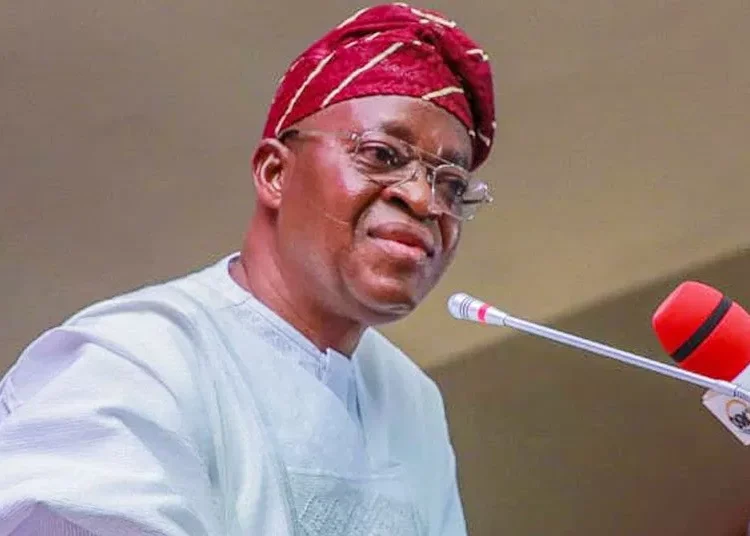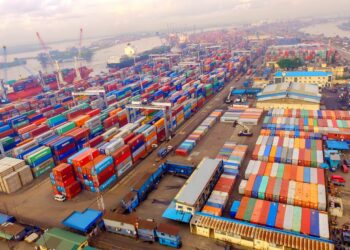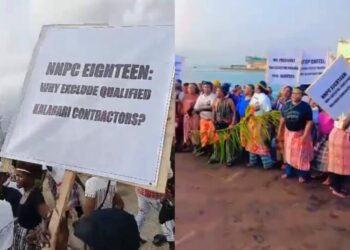The minister of marine and blue economy, Adegboyega Oyetola, has said that revenue from the nation’s Blue Economy has risen by 90 per cent.
Speaking at the 2025 day of the Seafarers’ celebration, held in Portharcourt, Rivers State, titled: ‘My Harassment-Free Ship,’ the minister said with automation, modernisation of the nation’s ports and the deployment of technology, the blue economy will surpass the Nigerian National Petroleum Company Limited (NNPCL) revenue concerning it.
Oyetola further stated that the ministry is doing its best to unlock the potential for the growth of the Nigerian economy through job creation and environmental sustainability.
“I want to assure you, even right now, within a little time, we’ve increased our revenue by not less than 90 per cent. We’re just not making noise about it, but with automation, with the modernisation of the port, with the development of technology, we believe that the Blue Economy will surpass the NNPC revenue.
“We’re doing our best to ensure that we’re able to unlock the potential of the options for the growth of the Nigerian economy, job creation and environmental sustainability,” he added.
To him, “In the past, there was no operating policy. We succeeded in putting a policy in place that is very robust and has met the world’s best standards. It is a policy that defines in clear terms the operation of the blue economy in Nigeria.”
Moreover, in a major milestone in Nigeria’s journey towards a smarter, more transparent, and efficient maritime sector, the federal government has launched a Maritime Labour E-Platform to digitise the governance of maritime labour.
Oyetola said the platform is more than just a portal, but offers real-time data access, enhances regulatory compliance, and creates a centralised system for labour administration.
“This E-Platform is a bold step toward digital governance, improved service delivery, and industry-wide innovation. The platform offers real-time data access, enhances regulatory compliance, and creates a centralised system for labour administration,” he said.
“I commend NIMASA for this forward-looking initiative, which aligns perfectly with our Ministry’s vision of ease of doing business, global competitiveness, and human capital development in the blue economy.”
While encouraging maritime stakeholders to embrace the new platform and make full use of its capabilities, he remarked that, this year’s theme: ‘My Harassment-Free Ship,’ speaks to the collective duty to make every ship a safe, respectful workplace.
“Harassment and bullying have no place in our maritime industry. We are prioritising quality training by upgrading maritime institutions, expanding capacity-building programmes, and aligning our seafarer education with international standards.”
“We are committed to full compliance with the STCW Convention, including recent amendments mandating anti-harassment training onboard ships. These steps are vital to ensure our seafarers remain competitive and globally employable,” he said.
Consequently, the director general of the Nigerian Maritime Administration and Safety Agency (NIMASA), Dr Dayo Mobereola, has called on Shipowners, operators and crewing agencies to review their operational manuals to align with the amendments to the MLC 2006 code.
The MLC 2006 codes, it was gathered, addressed issues affecting Seafarers such as recognition of seafarers as key workers, improved protection against shipboard violence and harassment, enhanced access to shore leave, repatriation, and updated medical and occupational safety standards.
The NIMASA DG also argued that a vessel is not just a seafarer’s place of work but a temporary home that must reflect the highest standards of dignity and professionalism, fostering zero tolerance for harassment.
Dr Mobereola, who further stated that, a harassment-free ship is a cohesive ship, stated that Nigeria will create confidential reporting channels for incidents of harassment and ensure that reports are thoroughly investigated and addressed.
“In addition, NIMASA will play its role by establishing clear policies and procedures for preventing and addressing harassment on Nigerian–flagged vessels, ensuring confidential reporting channels for incidents of harassment and that reports are thoroughly investigated and addressed.
“Today is a clear reminder to us all – government, employers, unions, shipowners, and civil society- that Seafarers should not be left alone in their struggles. They look up to us to help them foster a culture of zero tolerance on ships to protect their dignity,” he said.





